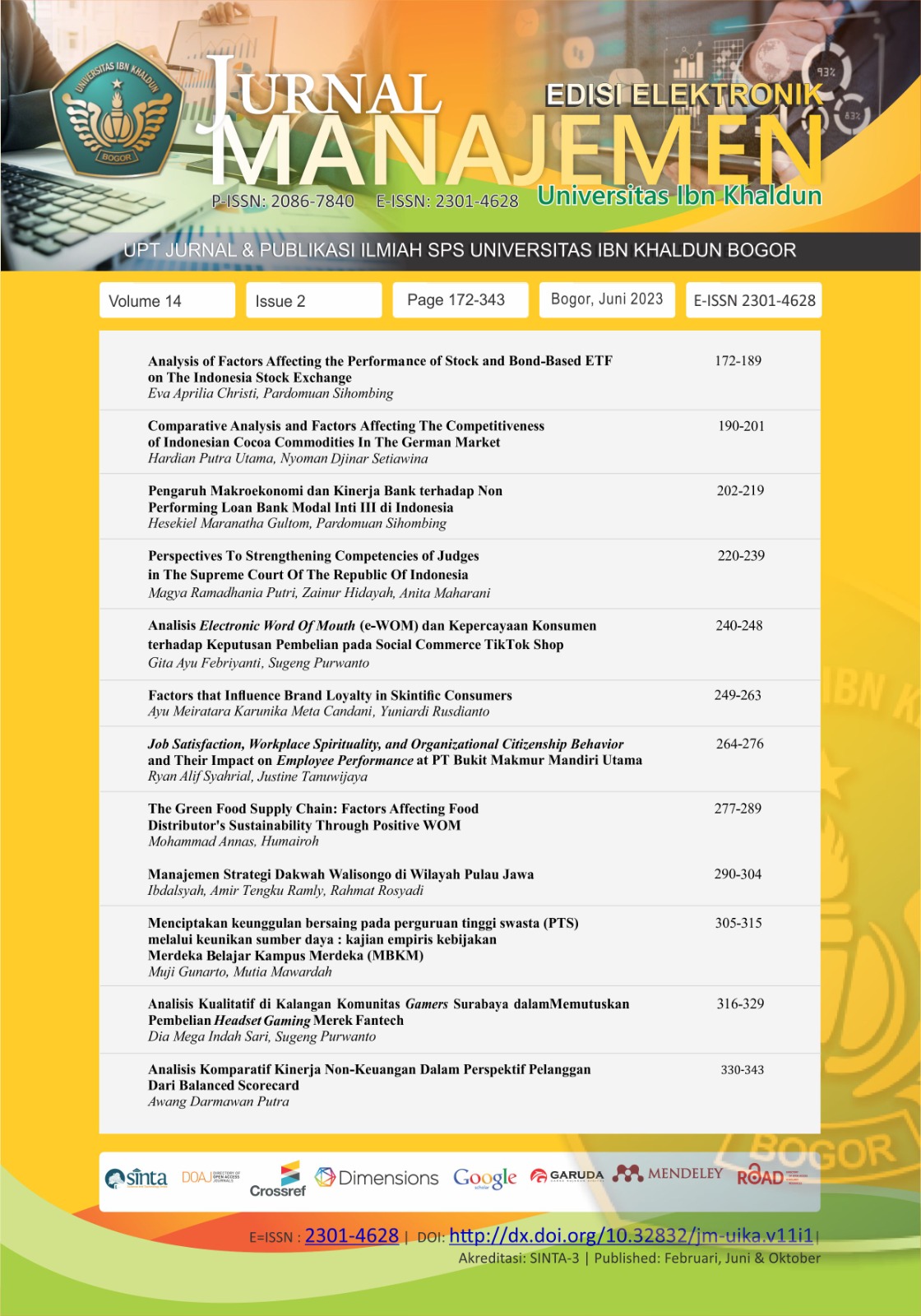Manajemen Strategi Dakwah Walisongo di Wilayah Pulau Jawa
DOI:
https://doi.org/10.32832/jm-uika.v14i2.715Keywords:
manajemen dakwah , manajemen pendidikan, manajemen strategik, walisongoAbstract
The success of the spread of Islam on the island of Java shows that the Walisongo have good missionary management. Evidence in the form of facts, data and information in this research can be traced from historical sites by confirming to the guards and security passed down from generation to generation from the direct heirs and officials in the local area. In addition, various documents in the form of literature can be studied in depth. This research was conducted using a case study approach related to managing the Walisongo da'wah strategy in the region of Java Island. The data used comes from literature and documents, with data analysis carried out in a descriptive-normative manner. The results of the study can be concluded that (1) the management of the walisongo's da'wah when they entered Java was carried out with good collaboration and teamwork, (2) the management of the walisongo's da'wah involved people who had positions, both in government and society, (3 ) the management of the walisongo's da'wah uses means through the culture, arts and traditions of the local community, (4) the management of the walisongo's da'wah is practised through educational activities with strategic management principles, which focus on the future with an activity approach and the culture of the community at that time.
References
Abdullah, R. (2015). Walisongo: Gelora Dakwah dan Jihad di Tanah Jawa (1404-1482M). Solo, Al-Wafi.
Ahmad, F. (2018). Manajemen Pendidikan Islam. Yogyakarta: K-Media
Afdilla, M. (2022).Pengelolaan Dakwah Santri Pondok Pesantren Darussalam SaranKabun Kabupaten Rokan Hulu. Doctoral dissertation. Riau: Universitas Islam NegeriSultan Syarif Kasim
Alhidayatillah, N. (2018). Dakwah Dinamis Di Era Modern (Pendekatan ManajemenDakwah). An-Nida', 41(2), 265-276
Anita, D. E. (2016). Walisongo: Mengislamkan Tanah Jawa (Suatu KajianPustaka). Wahana Akademika: Jurnal Studi Islam dan Sosial, 1(2), 243-266.
Atabik, A. (2016). Manajemen Dakwah Perspektif Al-Qur’an.TADBIR: Jurnal Mana-jemen Dakwah, 1(1).
Azyurmardi Azra, (2002), Islam Nusantara, Jaringan Global dan Lokal, Mizan, Ban-dung, h. 13
Clifford, G (1960), The Javanese Kyahi, The Changing Role Of Cultural-Broaker, Comparative
Daft, R. L. (2012). Management. Cengage Learning
Dhofier, Z. 1983, Tradisi Pesantren, Studi Pandangan Hidup Kiai, LP3ES, Jakarta,
Griffin, R. (2006) Business, 8th Edition. New York: Prentice Hall
Hadari, Nawawi (2003) Manajemen Sumber Daya Manusia, Yogyakarta: Gadjah MadaUniversity Press.
Hamriani, H. M. (2013). Organisasi dalam manajemen dakwah.Jurnal DakwahTabligh, 14(2), 239-249.
Hidayat, R. (2019). Manajemen Dakwah Bil Lisan Perspektif Hadits. Jurnal Al-Tatwir, 6(2), 33-50.
Joko Tri Haryanto (2003) IAIN Walisongo Mengeja Tradisi Merajut Masa Depan,Semarang: Pustakindo Pratama.
Juhji, J., Wahyudin, W., Muslihah, E., & Suryapermana, N. (2020). Pengertian, RuangLingkup Manajemen, dan Kepemimpinan Pendidikan Islam.Jurnal Literasi PendidikanNusantara, 1(2), 111-124.
Kusuma, B. M. A. (2020), Memperkuat Pendekatan Interdisipliner Dalam Kajian Mana-jemen Dakwah. Jurnal MD, 4(2).
Komariyah, L., Amon, L., Wardhana, A., Priyandono, L., Poernomo, S. A., Januar, S.,& Hadiyanti, D. (2021). Manajemen Pendidik & Tenaga Kependidikan Abad 21.Yayasan Penerbit Muhammad Zaini.
Lucey T & Lucey T (2004). Management Information Systems. Cengage LearningEMEA.
Mahmud, A. (2020). Hakikat Manajemen Dakwah.Palita: Journal of Social ReligionResearch, 5(1), 65-76..
Munir, Muhammad. Metode Dakwah, Jakarta: Kencana, Edisi Revisi, Cet. Ke-2.2006.Nur Syam, 2005, Islam Pesisir, LkiS, Yogyakarta, h. 253
Novitasari, E. (2020). Dasar-Dasar Ilmu Manajemen: Pengantar Menguasai Ilmu Mana-jemen. Anak Hebat Indonesia.
Pananrangi, H. A. R., & SH, M. P. (2017). Manajemen Pendidikan(Vol. 1). CelebesMedia Perkasa.
Rakhmawati, I. (2016). Karakteristik Kepemimpinan Dalam Perspektif ManajemenDakwah. TADBIR: Jurnal Manajemen Dakwah, 1(2).
Ramly, A. T., & Syukur, D. A. (2017). Strategic Management of Organization Development and Civil Service Based PumpingHR Model at Ibn Khaldun University Bogor.
Ritonga, A. A., Isa, M., Irwansya, M., Ginting, B. S., & Suyatmika, Y. (2021). FungsiManajemen Pendidikan Islam. Jurnal Pendidikan Tambusai, 5(3), 10608-10624.
Riyadi, F. (2016). Urgensi Manajemen dalam Bisnis Islam.BISNIS: Jurnal Bisnis DanManajemen Islam, 3(1), 65-84.
Safri, H. (2017). Manajemen dan Organisasi dalam Pandangan Islam.Kelola: Journal of Islamic Education Management, 2(2).
Sulaiman, J., & Putra, M. A. (2020). Manajemen Dakwah Menurut Perspektif Al-Qur’an. Jurnal Manajemen Dakwah, 8(1).
Sulistiono, B. (2014). Wali Songo dalam pentas sejarah nusantara.
Tasmara, T (1997). Komunikasi Dakwah, Jakarta: Gaya Media Pratama, Cet. Ke-1.
Terry, George R. (2009) Prinsip-prinsip Manajemen. Jakarta: Penerbit Bumi Aksara
YB. Suparlan, (1991). Kamus Indonesia Kawi, Kanisius, Yogyakarta, h. 225
Wasil, W., & Rosi, B. (2019). Strategi Dakwah Sunan Ampel dalam Menyebarkan Islamdi Tanah Jawa. Fatwa: Jurnal Manajemen Dakwah, 1(1).
Widji Saksono (1995) Mengislamkan Tanah Jawa. Bandung: Mizan
Downloads
Published
How to Cite
Issue
Section
License
Copyright (c) 2023 Jurnal Manajemen (Edisi Elektronik)

This work is licensed under a Creative Commons Attribution-NonCommercial 4.0 International License.
Authors who publish with this journal agree to the following terms:
- Authors retain copyright and grant the journal right of first publication with the work simultaneously licensed under a Creative Commons Attribution-NonCommercial-ShareAlike 4.0 International License that allows others to share the work with an acknowledgement of the work's authorship and initial publication in this journal.
- Authors can enter into separate, additional contractual arrangements for the non-exclusive distribution of the journal's published version of the work (e.g., post it to an institutional repository or publish it in a book), with an acknowledgement of its initial publication in this journal.
- Authors are permitted and encouraged to post their work online (e.g., in institutional repositories or on their website) prior to and during the submission process, as it can lead to productive exchanges, as well as earlier and greater citation of published work (See The Effect of Open Access).











